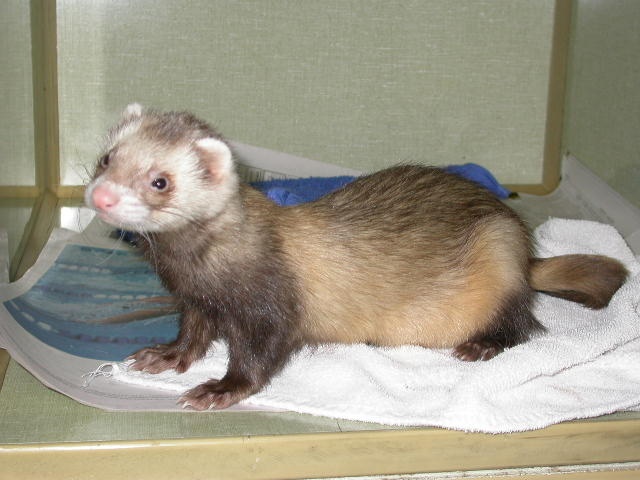
September is nearly over, so we are bidding the playful ferret adieu as our Animal of the Month. If you’ve been following us on Twitter @ExoticPetVets, you will have seen all of the interesting and fun facts we tweeted about ferrets throughout the month. In case you missed them, here is a summary of our tweets about ferrets. Did you know?:
- The ferret (Mustela putorius furo) is part of the weasel family (Mustelidae).
- Ferrets have one ancestor, the European polecat, from which it was domesticated over 2,000 years ago.
- Ferrets were originally used for pest control and hunting in Europe.
- The verb “ferret” can be used to describe the act of hunting with ferrets.
- The verb “ferret” can also be used to mean someone is searching for something – to ferret out the truth, for example.
- A female ferret is called a jill, but a male is not known as jack – he’s called a hob. Babies are called kits.
- A group of ferrets is called a “business of ferrets.”
- The pregnancy length for ferrets is about 42 days and they have an average litter size of eight kits.
- Ferret kits are born deaf and with their eyes closed. Their eyes open and they get their hearing at around three weeks.
- A ferret’s average lifespan is 5-8 years.
- Ferrets have something in common with cats – they can be easily litter trained.
- Ferrets are generally good-natured pets, but should be well socialized to help prevent aggressive behaviour.
- Ferrets can be trained to do tricks, which helps keep these intelligent animals mentally stimulated.
- Ferrets are curious and are great escape artists. If they can fit their head into a space, they can fit their body in too.
- All holes leading to inaccessible areas should be blocked to prevent your ferret from escaping or being injured.
- If you put a collar with a bell on your ferret, make sure it’s securely attached and that the bell can’t be swallowed.
- They say “curiosity killed the cat,” but a ferret’s curiosity and love of chewing can also have deadly consequences.
- Rubber, styrofoam, foam & plastic are appealing & must be kept away from ferrets as they’ll eat it and it’ll block them up.
- A gastrointestinal blockage in a ferret can lead to an expensive surgery or even the ferret’s death.
- Ferrets have anal glands that secrete a smelly liquid.
- Breeders typically have ferrets fixed and de-scented before they are adopted out as pets.

